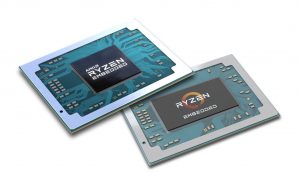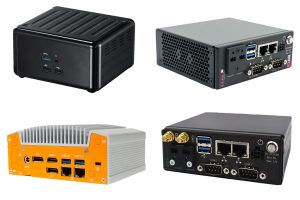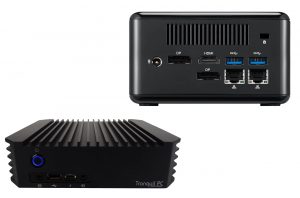NUC has successfully established itself as a mini box PC standard and while Intel has been the dominant player in this 4×4 form factor, AMD appears to be making up market share. The market is changing– especially in the industrial environment.
When it comes to low-power, high-performance embedded applications, AMD provides compelling graphics performance, multiple display support and power-to-performance scalability with its AMD Ryzen Embedded processor technology. Both of the currently available AMD Ryzen Embedded V1000 and R1000 Series processors integrate the ‘Zen’ CPU and ‘Vega’ graphics architectures, with high performance levels that are scalable from 6 to 54 watts in a pin-compatible package. Both variants also provide high energy efficiency up to 4 multi-threaded cores plus, discrete graphics processing that delivers up to 3.6 TFLOPS 16FP. This enables high-resolution, high-performance and4K multi-display 3D graphics for digital signage applications and immersive gaming. However, this level of performance is also beneficial for many industrial applications, such as industrial image processing in quality assurance, object recognition for situational awareness or AI-based edge analysis for predictive maintenance.
AMD Ryzen Embedded processors are supporting a growing ecosystem of software partners with pre-validated packages based on open source software for high-performance computing and artificial intelligence at the edge.The AMD Ryzen Embedded processors support a wide range of thermal design profiles (TDPs) and help application developers achieve optimum performance per watt and have full advantage of thermal limits. Such low power consumption allows the design of fanless and hermetically sealed systems. This design principle prevents the ingress of dirt and particles and improves the reliability of the overall system in harsh environments. Additionally, the processors support an extended temperature range of -40 °C to +105 °C, making them ideal for use in even the most challenging industrial settings. In all, AMD Ryzen Embedded processors are attractive for a wide range of industrial application areas, and in many cases only simple box systems are required since they tend to support all relevant interfaces, are compact, and available as application-ready certified systems from different manufacturers – for instance, in the eNUC form factor as standardized by the SGET.
SGET’s eNUC standard
This still comparatively young embedded form factor is the new shining star among the embedded box PCs. What makes it so popular is its convenient compactness, which means it can be used virtually anywhere as an application-ready system. And despite a footprint of just 4×4 inches, the embedded boards still offer sufficient space for numerous interfaces on the front and rear. Another advantage of these systems is the SGET standardization, of course. This is unique in the field of box PCs until now – neither for 3.5 inch systems nor for Pico-ITX is there a comparable manufacturer-independent standardization host. Such standardization provides major reasons for succeeding in the embedded market: Firstly, it ensures – like all standardized form factors – that footprint-identical system designs remain available for many years. Secondly, it guarantees uniform system configurations even when purchased from different manufacturers, since a certain set of interfaces is an integral part of the specification. The standard also demands that eNUC boards support at least the industrial temperature range of 0 °C to 60 °C or even the extended temperature range of -40 °C to 85 °C. In addition, manufacturers are expected to guarantee long-term availability of at least 5 years. All this is unique in the box PC market thanks to the SGET specification.
Extensive ecosystem
With so many convincing advantages, there are already numerous eNUC board and system manufacturers on the market today. This gives customers the freedom to always choose the best solution. The wide range of available accessories – from standard cooling solutions and cable sets to housings – makes it easy to purchase components from third-party providers. As it has evolved from a commercial standard, the eNUC form factor also offers low component costs for embedded applications because there is often a mass-produced option so that NRE costs can be kept to a minimum. Last but not least, the fact that a large developer community is working with this form factor ensures that the standard is constantly improving.
All these advantages make compact standardized eNUC box PCs a highly attractive choice for many low-power small form factor applications. The portfolio of use cases is extremely extensive since the compact systems fit virtually anywhere in mobile and stationary applications. With individual interface extensions for a variety of industrial and embedded markets, there is also a wide choice of different interface configurations and mounting options from various manufacturers. For example, there are robust desktop solutions for workstations, as well as wall-mounted or DIN rail systems for use in control cabinets, and VESA mounting behind displays. The eNUC standard is also perfect for automotive applications – as long as a suitable integrated power supply is available.
Established embedded vendors place their bets on AMD
Suppliers of such compact box PCs for use in harsh industrial environments include companies such as ASRock Industrial, EEPD, OnLogic and Simply NUC. Each of these suppliers currently offer an open and customizable platform based on the AMD Ryzen Embedded V1000 and R1000 Series processors. The embedded mini PCs BoxPC‑NUCV and BoxPC‑NUCR from EEPD are specifically designed for the highest reliability and long-term availability requirements. This product family provides high-performance computing for even the smallest spaces, a high degree of functional safety and reliability in temperature ranges from -40 °C to +85 °C, and great flexibility. Using the proven USB I/O modules from EEPD, industrial interfaces such as CAN, GPIO or LTE/UMTS are quickly added, while the automotive-grade wide-range power supply makes it easy to integrate the box PCs into mobile systems such as vehicle displays and mobile robots.
ASRock Industrial positions its fanless box PCs 4×4 iBOX-R1000 and 4×4 iBOX-V1000 as versatile high-performance embedded mini PCs for industrial application in the temperature range from 0 °C to 50 °C. OnLogic sees its fanless ML100G-40 dual- and quad-core box PCs as the ideal solution for industrial gateways and multicore control tasks, or as an alternative to desktop solutions for workstations. With its robust and durable Sequoia V8 and Sequoia V6 systems, Simply NUC focuses primarily on digital signage displays, electronic kiosk and information systems, and edge analysis. For this purpose, the two box PCs offer a rugged metal housing for VESA mounting and customer-specific I/O configurations, among other things.
Powerful media and enterprise mini PCs
For more price-sensitive applications, the AMD partners also offer more economical mini PC designs. The 4×4 BOX-R1000V and the 4×4 BOX-V1000M from ASRock are two examples of highly cost-efficient, powerful and versatile embedded mini PCs for home entertainment, business and industrial applications. The multi-display mini PCs from Tranquil are designed for the specific requirements of gaming, digital signage and POS applications. As such, they not only support up to four 4K displays, but can also be configured with up to 32 GB RAM, 2 TB M.2 SSDs, and 2x dual-band Wi-Fi and Bluetooth.
Artificial Intelligence of Things (AIoT)[i]
The Internet of Things (IoT) and edge computing are the two most important technology developments in embedded computing in recent years. With the availability of more computing power thanks to high-performance multicore CPUs and massively parallel computing units such as the AMD Radeon graphics of the AMD Ryzen Embedded V1000 and R1000 SoCs, IoT and edge computing for artificial intelligence (AI) can increasingly be consolidated in one system. This combination of IoT infrastructure and AI technologies, also referred to as AIoT, will lead to even more efficient IoT applications, improved human-machine interaction, and more powerful data management and analysis in the future. However, to make this AIoT happen quickly, requires high-performance, multifunctional processor solutions such as the AMD Ryzen Embedded family, which are supported by an extensive ecosystem of hardware and software partners who can offer OEMs suitable packages based on open source AIoT software such as Radeon Open Compute (ROCm) and OpenCL. The list of AMD’s software partners in this area includes AlphaInfo, Beechwoods, ClearBlade, Enigmedia, and MulticoreWare.[ii]


Figure 01: The AMD Ryzen Embedded V1000 and R1000 Series processors seamlessly integrate the ‘Zen’ CPU and ‘Vega’ graphics architectures and combine powerful GPU graphics performance with leading CPU performance.
| Model | TDP Range | Cores/Threads | Base/turbo frequency | Graphics Compute Units | GPU Freq | Individual Displays | Junction Temperature Range (°C) |
| V1807B | 35-54W | 4/8 | 3.35/3.8 | 11 | 1.3 | 4 | 0 – 105 |
| V1756B | 35-54W | 4/8 | 3.25/3.6 | 8 | 1.1 | 4 | 0 – 105 |
| V1605B | 12-25W | 4/8 | 20/3.6 | 8 | 1.1 | 4 | 0 – 105 |
| V1404I | 12-25W | 4/8 | 2.0/3.6 | 8 | 1.1 | 4 | -40 – 105 |
| V1202B | 12-25W | 2/4 | 2.3/3.2 | 3 | 1.0 | 4 | 0 – 105 |
| R1606G | 12-25W | 2/4 | 2.6/3.5 | 3 | 1.2 | 3 | 0 – 105 |
| R1606G | 12-25W | 2/4 | 2.4/3.3 | 3 | 1.0 | 3 | 0 – 105 |
| R1606G | 8-10W | 2/4 | 1.5/2.8 | 3 | 1.0 | 3 | 0 – 105 |
| R1102G | 6W | 2/2 | 1.2/2.6 | 3 | 1.0 | 3 | 0 – 105 |
AMD Ryzen Embedded V1000Series and R1000Series Processors with integrated GPU


Figure 2: Rugged industrial box PCs with AMD Embedded V1000 and R1000 series processors are available from ASRock Industrial, EEPD, OnLogic and Simply NUC.


Figure 3: Cost-optimized media and enterprise mini PCs with long-term availability and AMD Ryzen Embedded processors are available from ASRock and Tranquil, for example.
[i] https://internetofthingsagenda.techtarget.com/definition/Artificial-Intelligence-of-Things-AIoT
[ii] https://www.amd.com/en/products/embedded-minipc-solutions











